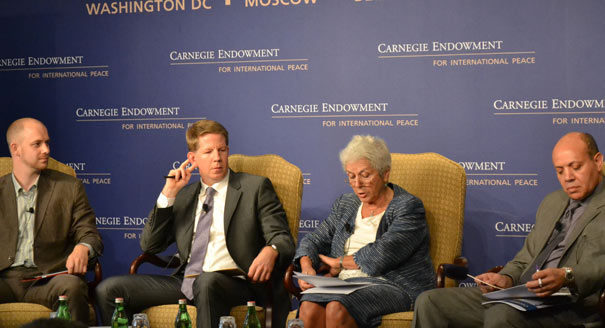Registration
You will receive an email confirming your registration.
IMGXYZ3944IMGZYXNearly four decades of the Qaddafi regime’s systemic marginalization and mismanagement of Libya’s eastern and southern regions have resulted in deep security, political, and economic problems that continue to challenge the country’s transition toward democracy. Despite modest political progress with the successful July 7 parliamentary elections, Salafi violence such as the September 11 consulate attack in Benghazi highlights that the region’s security vacuum can threaten to derail any progress.
To analyze the current security challenges in Libya’s periphery and understand their implications, Carnegie hosted a discussion with Frederic Wehrey (senior associate at the Carnegie Endowment), Peter Cole (former senior analyst for the International Crisis Group in Tripoli), and Fadel Lamen (president of the American-Libyan Council). Carnegie’s Marina Ottaway moderated the discussion.
The Three Types of Instability in the Periphery
- The Push for Autonomy: Attempts to actively mobilize easterners in support of autonomy—led by groups like the Barqa Council, which advocated a boycott of the political process—have largely failed, according to Wehrey. The recent successful July 7 parliamentary elections may serve as a referendum on the issue of national unity, but the key litmus test will be the drafting of the new constitution.
- Salafi militancy: The recent uptick in Salafi militancy and violence highlights the fracturing of the Salafi movement, with some groups hoping to enter the political arena and others resisting, said Wehrey. Although militias like the notorious Ansar al-Sharia have been making noise and causing trouble, they have in reality failed to gain traction with the Libyan street. Most importantly, Wehrey argued, Libyans have “antibodies” against these vociferous Salafi militias and have acted to push them out.
- Ethnic Conflict: The simmering conflict between ethnic Arabs and non-Arab Tabu in the southern region of Kufra, a vestige of Qaddafi’s divide-and rule-policy, has affected all of Libya, Wehrey stated.
Libya’s Critical Southern Region
Libya’s south is a hub of cross-border smuggling of illegal drugs, weapons, and humans. The large size of the territory and its scattered population make the south a uniquely difficult security challenge for the Libyan government, Cole said.
- Demographics of the Region: Cole explained that there are three major ethnic groups in the region: the sub-Saharan Tabu tribe in Libya’s southeast, the Berber Tuareg in Libya’s southwest, and the very poor Arab Awlad Suleiman tribe, which is geographically situated between the Tabu and Tuareg.
- Smuggling Economy: Corruption and smuggling are structurally endemic in the region, with many locals involved in smuggling either from the lower ranks of the security services or employed by the state. Decades of manipulation and marginalization by the Qaddafi regime have left many Tabu and Tuareg with very limited economic opportunities and some without clear citizenship links to Tripoli, leading many to turn to illicit trafficking, Cole argued.
- No Military Solution: Under Qaddafi, the military was fractured, operating much like the militias in the region. That meant the armed forces could not secure the country, and that lack of security persists today. The prospects for a military solution to Libya’s problems are thus not good, Cole explained. Instead, the government must deal with the underlying social issues that face the various ethnic groups and offer them economic alternatives, Cole concluded.
Ways to Secure the Periphery
- Addressing the History of Manufactured Conflict: Lamen explained that Qaddafi was a conflict creator and manager, and he used Libya as his tool to achieve regional and global goals. After the fall of Qaddafi, Libyans were forced to build a new state and institutions that must hold the country together, Lamen stated.
- Solving the Tribal Problem: The tribes must be integrated into Libyan society, but their practice of marrying into families that are of the same ethnic group but are non-Libyan is impeding that process, Lamen said. Lamen also explained that the government must act with security and policy tools to contain the proliferation of smuggling before it is too late, as tribes are now beginning to work with international criminal organizations.
- Solving the Salafi Problem: Lamen clarified that there was an unholy alliance between Qaddafi’s regime and the Salafis, which Qaddafi helped prop up and manipulate for his goals. Although Qaddafi is gone, the members of the security services that were responsible for handling the Salafis remain and can infiltrate the ranks of the Salafi militias, Lamen said. According to Lamen, the government must institutionalize the security forces and rely on intelligence policies to contain the Salafis. It must not issue ultimatums that it cannot deliver on, as it has in the past. The Salafi militancy issue must be solved politically and socially since the time has passed for a military option, Lamen concluded.
- Solving the Security Problem:: Wehrey explained that the Libyan Army was marginalized by Qaddafi in favor of specialized militias that did his bidding. There is no coherent security structure in either the Ministry of Interior or Ministry of Defense, and the government currently lacks the capacity to provide effective community policing or to thoroughly guard the border. For the Libyan state to exert its influence, it must undergo reform and adopt a strategy for a new Libyan Armed Forces that can help secure and tie the country together, Wehrey noted.
- Solving the Bureaucratic Problem: Lamen stated that the Libyan government does not have ways to tackle these issues and continues to be leery of international help. Midlevel officials in Libya’s barely functioning bureaucratic institutions are unwilling to take the initiative and adopt real reforms or new plans. The Libyan government can only solve its problems if it accepts the critical help offered from the international community and learns the tools needed to rebuild the state, Lamen concluded.
